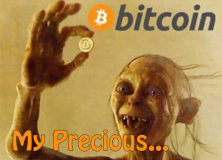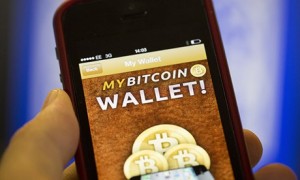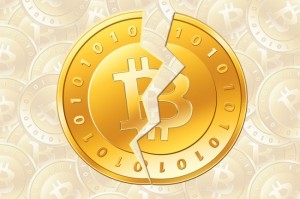 NOTE 2/25/14: Only days after writing this article, bitcoin value went into freefall. The reason is that the Mt. Gox bitcoin exchange (mentioned in this article) has ceased operating and has filed for bankruptcy protection. One news report stated that $165 million in bitcoins that were supposed to be securely kept within the exchange’s cyber vault is unaccounted for.
NOTE 2/25/14: Only days after writing this article, bitcoin value went into freefall. The reason is that the Mt. Gox bitcoin exchange (mentioned in this article) has ceased operating and has filed for bankruptcy protection. One news report stated that $165 million in bitcoins that were supposed to be securely kept within the exchange’s cyber vault is unaccounted for.
—————————————————————————————————-
If you haven’t heard of Bitcoin, I expect you will be hearing about it in the mainstream media shortly.
Bitcoin is a currency that doesn’t exist. It is a virtual world currency, but is being used to buy items as a form of real world cash. It’s currently accepted in about 1000 brick and mortar businesses throughout the world and about 35,000 online businesses.
Even more recently, it was just announced that two Bitcoin ATM’s are being made available to Bitcoin believers in the U.S.
Yesterday, one of the USA’s first Bitcoin ATM machines, tucked in the backroom of a downtown Austin bar was unveiled. Other Bitcoin machines have sprouted in Boston and Albuquerque but those only offer Bitcoins for cash — not cash for Bitcoins. The Austin ATM would be the first of its kind in the USA to dispense cash.
The Austin ATMs are being rolled out in time for SXSW (South-by-Soutwest), the three-week interactive/film/music conference that begins Mar. 7.
Hard to wrap your brain around a concept of placing a value on something that doesn’t physically exist, or even have something of value to back it up (such as a precious metal or government oversight)? Don’t feel alone. Economists are having a hard time dealing with it, as well.
First, you need to know how Bitcoin came into existence.
Bitcoin is a peer-to-peer payment system and digital currency introduced as open source software in 2009 by pseudonymous developer Satoshi Nakamoto. It is a cryptocurrency, so-called because it uses cryptography to control the creation and transfer of money. Conventionally, “Bitcoin” (capitalized) refers to the technology and network whereas “bitcoins” (lowercase) refers to the currency itself.
Bitcoins are created by a process called mining, in which participants verify and record payments in exchange for transaction fees and newly minted bitcoins. Users send and receive bitcoins using wallet software on a personal computer, mobile device, or a web application. Bitcoins can be obtained by mining or in exchange for products, services, or other currencies.
Those running Bitcoin client software, are called miners and are rewarded with newly created bitcoins as well as transaction fees. Payment processing work done by miners verifies each transaction as valid and adds it to the block chain. Bitcoin payment processing fees are optional and generally substantially lower than those of credit cards or money transfers.
Online Wallets
Bitcoin uses public-key cryptography, in which pairs of cryptographic keys, one public and one private, are generated. A collection of keys is called a wallet. Note that sometimes this term is used to mean the software itself in the sense of digital wallet. A Bitcoin transaction transfers ownership to a new address, an alphanumeric string of the form random letters and numbers derived from public keys by application of a hash function and encoding scheme.
Even with this security, online theft has occurred in the past.
Supply and Demand
The demand by techies and those that believe the Bitcoin system will replace national currencies is the driving force behind bitcoins gaining attention. Currently, there are only 12 million full bitcoins in existence with about 25 being generated each minute through mining. The developers will only allow 21 million to be created. This, of course, has created a limited supply for those who try to obtain them.
This is where bitcoins will never meet the demand of reality or a fairly stable value.
As of this writing, 1 full bitcoin has a value of under $150.00 (US), but volatility is extreme with bitcoins. Much of it depends on those who have them, world governments reaction to them and an unregulated bitcoin trading exchange platform, called Mt. Gox, where bitcoin owners set the value when buying and selling them.
For example, when China outlawed the use of bitcoins as a payment for goods or services in December of 2013 the value of the bitcoin plummeted from $1300 ( a one-day high) to $900. Since then their value has continued to decline and has seldom remained constant for long.
A better example is when, in 2011, Bitcoins saw a rollercoaster ride of $0.30 to $32 and then to $2.
The only reason it seems to be at its current level is because representatives from the Department of Justice and financial regulators for the Securities and Exchange Commission gave an opinion to a United States Senate committee hearing, at which the committee was informed that virtual currencies were a legitimate financial service. It was on the news of this opinion that bitcoins jumped in value once again.
This opinion did not legitimize the use of bitcoins and it would only require the U.S. Government to make the use of bitcoins illegal, just as China did, to see the bitcoin lose most if not all its value. The U.S. dollar is the currency by which all countries base their own currency’s worth.
Bitcoin Future
There isn’t one. Some call it a Ponzi Scheme. Others refer to it as a Pyramid. In either case it will be those who gathered the most bitcoins in the early years and sell them off to the idiots who think they have value, who will end up with real currency in the end.
Does anyone believe that any government will allow the use of a currency, that can’t be taxed, to pay for goods and services produced? They aren’t addressing the problem now because the amount of money in transactions worldwide isn’t worth the time and effort, but if Bitcoin should survive its own self-sustaining problem and become a threat to the world economy, it will be shut down. Completely and permanently.
Right now, it’s an amusing diversion for Trekkies and techies who dream of a future where paper money and paychecks won’t exist.
As Economist and Professor John Quiggin evaluating bitcoin as a financial asset forecast, “bitcoins will attain their true value of zero sooner or later, but it is impossible to say when.”
He’s right. The true value of nothing is nothing. You don’t want to be one of those holding a bag filled with non-existent bitcoins.
Disclaimer: On January 4, 2016, the owner of WestEastonPA.com began serving on the West Easton Council following an election. Postings and all content found on this website are the opinions of Matthew A. Dees and may not necessarily represent the opinion of the governing body for The Borough of West Easton.









